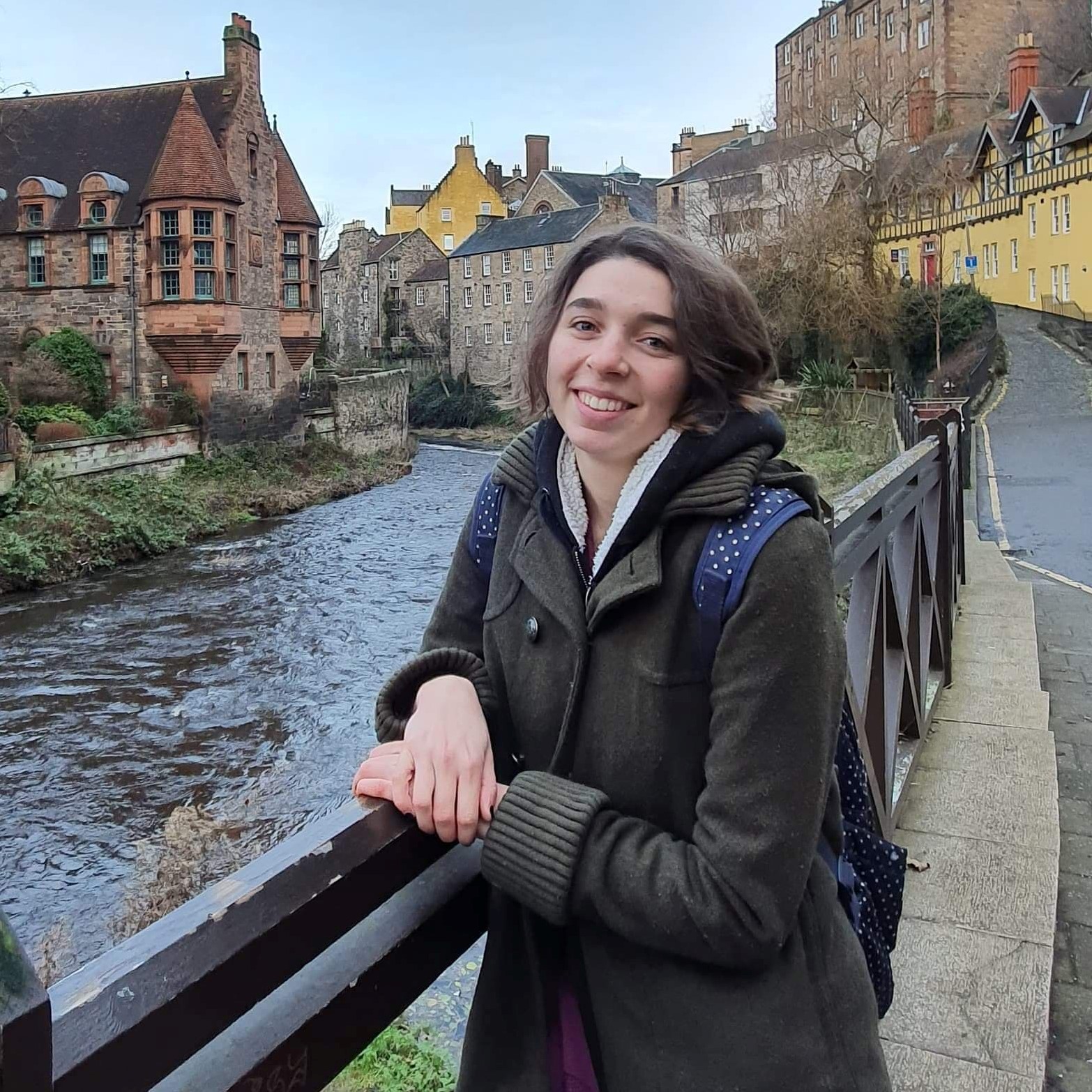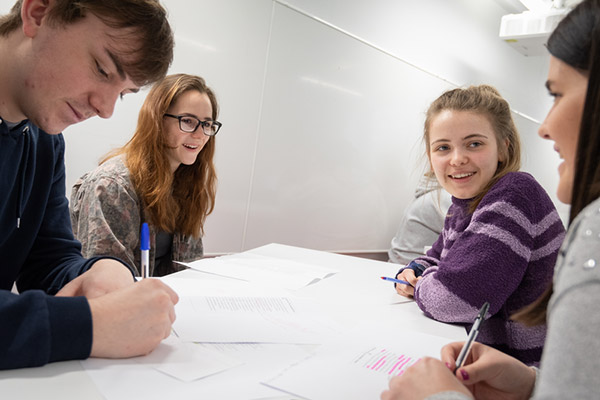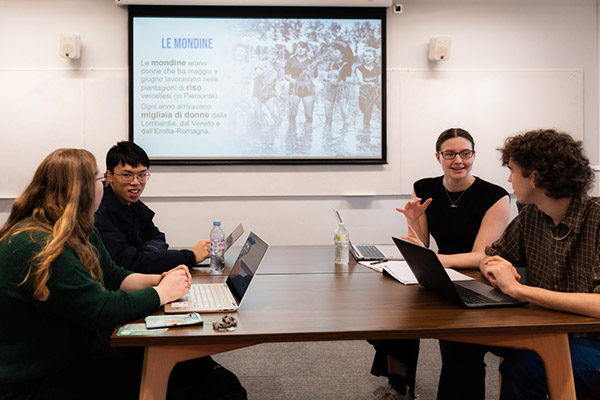View semester dates

BA (Hons) German and Italian (with a year abroad)
Hone your language skills and explore the history, politics and culture that have shaped German and Italian-speaking countries.
Year of entry: 2026/27
View semester dates
Why study German and Italian at York?
Develop your language proficiency. We have a distinctive approach to teaching. You'll be taught in the language you’re learning, with a focus on society, politics and culture. Guided by our supportive staff, many of whom are native speakers, you’ll rapidly develop your fluency and knowledge. You'll study Italian as a beginner (ab initio). You'll be amazed at how you progress.
Extensive range of modules. From history and politics to arts or translation, you’ll be able to follow your own interests. You can even get a head start in Teaching English as a Foreign Language with TEFL modules that help you prepare to gain a qualification.
Immerse yourself in language and culture with a year abroad. You’ll study at one of our partner universities and/or take up a work placement or internship. Past placements have been in the media, translation, heritage, marketing and finance sectors around the world. Your plans will be supported by our year abroad coordinators.
Join a vibrant international community. Our department comprises modern languages, English language and linguistics, drawing together staff and students with a shared love of language. You’ll be invited to regular events and talks.

The thing that really sets Languages at York apart from other universities is that they teach the languages in the language. Of course, if you really just can’t wrap your head around something, they will explain it in English if need be.
Course content
During your degree, you will study mainly modules in languages and cultures. You can add modules in linguistics, choose from a range of elective modules across the university, including a third language.
Your linguistics modules will help you understand the nature of language itself: how it is structured, how it has evolved, and how we use and understand it within our society. These modules will enable you to think critically and approach your studies from an analytical point of view.
You’ll go abroad in your third year. You can choose a work placement, internship or studying at one of our partner universities. Our internship students have been to a wide range of organisations including in schools, the heritage sector, the media, translation, marketing and finance sectors around the world. Your plans will be supported by our departmental year abroad coordinators.
Throughout your programme, you can tailor your degree to your interests. You can:
- focus on studying German and Italian in equal terms in Years 2 and 3.
- choose to study either German or Italian predominantly in Years 2 and/or 3.
- choose to add linguistics modules throughout your degree.
Study Italian from scratch
You will study Italian ab initio, meaning you don't need to have any knowledge of the language before you arrive. In your first year, you will make rapid progress in your language skills. You will also develop your understanding of Italian society and culture in order to be prepared for more advanced studies from your second year onward.
Year 1
Core modules
- German Language and Cultures: Upper Intermediate
- Intensive Italian Language and Cultures: Beginner
- Understanding Language in the Real World
- Understanding German-speaking Cultures and Societies (post-A level route)
- Understanding Italian-speaking Cultures and Societies (ab initio route)
Option modules
You will study one option module. Examples can be found below. Some option module combinations may not be possible. The options available to you will be confirmed after you begin your course.
Academic integrity module
In addition to the above you will also need to complete our online Academic Integrity module.
Year 2
Core modules
You'll study language modules in German and Italian.
Option modules
You will also study four option modules, including at least one option in German and one option in Italian. Examples can be found below. Some option module combinations may not be possible. The options available to you will be confirmed after you begin your course.
- The Role of Art in Italian Society
- World Cinemas: Representing National and Transnational Societies and Cultures
- The Berlin Republic
- Teaching English as a Foreign Language I
- Teaching English as a Foreign Language II
- Acoustic Phonetics and Phonological Analysis
- Sociolinguistics
- The Language of Turn and Sequence
- Aspects of a Theory of Syntax
- Language Acquisition
- Plurilingualism, Multilingualism and Transnational Languages: Concepts, Strategies and Approaches
The options available to you will be confirmed later in the year. For further information please get in touch.
Elective modules
You may be able to replace one option module with an elective module, studying a complementary subject, a language or an interdisciplinary topic.
Year 3
In your third year, you’ll go abroad for a year. You can choose to study at another university or complete a work placement/internship. You may also be able to complete a British Council English Language Assistantship. The year abroad is assessed on a pass/fail basis by the University of York.
Immersing yourself in the language and culture of another country will enable you to become fluent in the language, both orally and written. The skills you gain will prepare you for both your final year of study and your future career.
Year 4
Core modules
You'll study core language modules in your final year. These are designed to consolidate your critical skills through in-depth research and analysis. By this stage in your degree, you'll be able to demonstrate oral and written fluency, as well as accurate language use in its social and cultural contexts.
Option modules
You will also study four option modules, including at least one option in German and one option in Italian. Examples can be found below. Some option module combinations may not be possible. The options available to you will be confirmed after you begin your course.
Language modules:
- The Mafia from its Origins to the Present Day
- World Cinemas: Representing National and Transnational Societies and Cultures
- Modern German Language
- Independent Study in Languages and Cultures
Linguistics modules:
- Topics in Phonetics and Phonology
- Multimodality: Language and the Body
- Psycholinguistics: Language Processing
- Topics in Psycholinguistics: Language Processing
- Neurolinguistics: Language and the Brain
- Linguistic Approaches to Second Language Acquisition
- English Place-names across Time and Space
- Bilingualism
- Teaching English as a Foreign Language II
- Translation: Methodology and Practice
The options available to you will be confirmed later in the year. For further information please get in touch.
Elective modules
You may be able to replace one option module with an elective module, studying a complementary subject, a language or an interdisciplinary topic.
Our modules may change to reflect the latest academic thinking and expertise of our staff, and in line with Department/School academic planning.
Learning outcomes
Every course at York has been designed to provide clear and ambitious learning outcomes. These learning outcomes give you an understanding of what you will be able to do at the end of the course. We develop each course by designing modules that grow your abilities towards the learning outcomes and help you to explain what you can offer to employers. Find out more about our approach to teaching and learning.
Learning outcomes for this course
- Understand key aspects of the societies and cultures of the studied languages based on effective research and critical evaluation of key positions, viewpoints and perspectives. (Knowledgeable researcher)
- Apply creatively and critically your understanding of languages and cultures in their transnational context in order to help negotiate and solve problems arising from social, cultural and linguistic diversity. (Creative problem solver
- Communicate effectively orally and in writing in your language(s) of study to provide evidenced, structured and well-supported information, arguments and advice to mono- as well as multilingual audiences. (Multilingual communicator)
- Mediate concepts and texts in a range of settings using your full repertoire of languages to facilitate the achievement of collective aims in trans- and intercultural contexts (Effective mediator)
- Design, manage, and contribute efficiently and effectively to individual and collaborative projects using your knowledge and expertise, as well as leadership and negotiation skills. (Resourceful team worker)
- Develop your expertise in the languages, cultures and societies as well as your language repertoire by recording, reflecting upon and evaluating your practices and identifying appropriate resources for your personal and professional learning needs. (Reflective practitioner)
- Engage with confidence in multilingual and transcultural encounters based on your acquired awareness of, and sensitivity to, the relativity of social, cultural and linguistic norms. (Transcultural agent)

Studying languages at York will give you a deep understanding of current culture and language. You’ll get a taste for the real, everyday, current culture of your country of study, as well as, of course, learning to speak the language.
Fees and funding
The fees and funding information here is for students starting in the 2026/27 academic year.
If you take a year abroad or year in industry you'll pay a reduced rate of fees for that year.
Annual tuition fees
| UK (home) | International and EU |
|---|---|
| £9,535 (TBC) | £26,900 |
The UK government has announced its intention to increase tuition fees from £9,535 to £9,790 for the 2026/27 academic year. We expect this to apply to new UK (home) undergraduate students starting their studies in September 2026.
UK (home) or international fees?
The level of fee that you will be asked to pay depends on whether you're classed as a UK (home) or international student. Check your fee status.
Fees for subsequent years
- UK (home) fees may increase within the government fee cap in subsequent academic years. We will notify you of any increase as soon as we can.
- International fees are subject to increase in subsequent years in line with the prevailing Consumer Price Index (CPI) inflation rate (up to a maximum of 10%).
More information
For more information about tuition fees, any reduced fees for study abroad and work placement years, scholarships, tuition fee loans, maintenance loans and living costs see undergraduate fees and funding.
Additional costs
Set texts are available from the Library or online, but you may wish to buy your own copy for some modules. These typically cost between £10 and £30. For ab-initio languages you may need to buy books with a total cost of £50 to £60. Second hand books are often available more cheaply.
Funding
We'll confirm more funding opportunities for students joining us in 2026/27 throughout the year.
- UK government loans
- UK scholarships and bursaries
- International scholarships
- Country-specific funding
- US loans
Departmental funding
Find out more about funding specific to Languages and Linguistics.
York, Oxford, Cambridge, Imperial
Just four UK universities are rated Gold for teaching and top ten for research* in the latest national assessment exercises.
* Awarded joint 10th in the Times Higher Education ranking of the Research Excellence Framework 2021.
Teaching and assessment
You’ll study and learn with academics who are active researchers, experts in their field and have a passion for their subjects. Our approach to teaching will provide you with the knowledge, opportunities, and support you need to grow and succeed in a global workplace. Find out more about our approach to teaching and learning.
Teaching format
We offer you extra study support in several ways. Our Peer Assisted Learning programme gives you the opportunity to work with other students.
German and Italian
Our focus at York is on effective communication in German and Italian, as we integrate the teaching and learning of content and language. That is why:
- we are unique in teaching our core modules in their language of study
- we teach mainly in small seminars
- classroom interactions and assessments are in German and Italian
- we emphasise issues of cultures and society, allowing you to develop a high level of transcultural awareness to underpin your language skills
- many of our staff are native-speakers of the languages we teach
Contact hours
In the first year of the degree, you will typically have 11 hours of contact time per week per semester, most of which is organised as seminars or workshops.
Contact hours in the second and final year can vary depending on individual module choices.
In the UK, full-time students are expected to spend 1,200 hours a year learning. That's about 40 hours of classes and independent study each week during semesters. Everyone learns at a different rate, so the number of hours you spend on independent study will be different to other students on your course.
Facilities
We have our own e-Lab for teaching. Here, you'll have access to a variety of resources, including specialist linguistics software and online language-learning materials.
Teaching location
You will be based in the Language and Linguistic Science buildings on Campus West.
About our campus
Our beautiful green campus offers a student-friendly setting in which to live and study, within easy reach of the action in the city centre. It's easy to get around - everything is within walking or pedalling distance, or you can use the fast and frequent bus service. Take a campus tour.
Assessment and feedback
You'll be assessed in a variety of ways, including essays, projects, presentations, and written and oral exams. Assessments include formative work which will help you practise or develop skills, but will not count towards your final degree mark.
Instructors provide you with feedback in a variety of forms, for example: written feedback including annotations of your work, in-class discussion of common problems, model answers, one-on-one discussion of projects, or responses and comments to work submitted online.
Your year abroad is assessed. If you are studying at a university, you must satisfactorily attend courses and complete two assessments in the language of study which will be submitted to York during the year. If you are on a teaching assistantship, you must satisfactorily carry out your teaching duties. However, your marks on the year abroad assessments do not contribute towards your overall degree mark.
Disability information
We can make reasonable adjustments to assessment procedures for students with disabilities. However, if you have dyslexia please note that it is not possible to make adjustments in the marking of work written in a closed language exam. This is because accurate spelling is one of the assessment objectives for language exams. Closed exams make up only a proportion of the assessment types used for languages. There are other assessment types such as coursework and oral presentations which are also used. As a student with dyslexia you could apply for extra time in closed exams, if this would be of assistance. See the University's disability support pages for further details.

Doing two languages can keep you quite busy but there is still plenty of time to explore other hobbies of yours. Here at York, we have societies for many different languages. Some of the exciting socials you can look forward to include movie nights, cooking classes and quizzes!
Careers and skills
- The study of language and linguistics at York equips you with effective communication, critical thinking, and project management skills, which translate readily into any work context.
- The combination of the analytic, transcultural, and communicative competencies you'll learn during your degree ensures that you are a highly sought-after graduate. You'll become proficient in all aspects of managing small-scale linguistic analysis projects, from identifying the research questions, to communicating the findings. This skill set will open the door to many different careers.
- Our graduates have an excellent record of pursuing fulfilling paths after graduation. Learn more about graduate career destinations.
Career opportunities
- Marketing and communications
- Publishing
- Broadcasting and journalism
- Local government and public service
- Business, finance and accountancy
- Teaching
- Translation and interpreting
- IT and software development
Transferable skills
- Effective communication skills
- Intercultural awareness
- Critical thinking
- Project management
- Independent learning
- Data analysis
- Problem solving
- Teamwork
Entry requirements
| Qualification | Typical offer |
|---|---|
| A levels | AAB including German |
| Access to Higher Education Diploma | Obtain Access to HE Diploma with 36 credits at Distinction and 9 credits at Merit or higher. An A level or equivalent qualification in German will be required. |
| BTEC National Extended Diploma | DDD. An A level or equivalent qualification in German will be required. |
| European Baccalaureate | 80% overall average including 80% in German. |
| International Baccalaureate | 35 points including 5 in German at Higher Level. |
| T levels | We are currently not accepting T Levels for this course unless an additional A Level (or equivalent qualification) in German has been taken. |
| Scottish Highers / Advanced Highers | Advanced Highers - B in German plus Scottish Highers - BBBB We may also be able to consider three Advanced Highers or a combination of Highers and Advanced Highers, where an applicant does not meet the grade requirement through Highers alone. Please contact us to discuss your qualifications. |
| International foundation programme | Foundation Certificate from our International Pathway College or an appropriate alternative. |
| Other international qualifications | Equivalent qualifications from your country |
Additional requirements
You can only take the Italian language part of this programme ab initio (from scratch, or with a qualification at AS level or below). It is not suitable for those who already have an A level in this language.
Our language programmes are designed to develop fluency. For this reason we do not normally offer places to native or near-native speakers who wish to study their own language.
Alternative offers
Meeting the following additional criteria may qualify you for an alternative offer.
| Criteria | Adjustment |
|---|---|
| Widening participation | BBC including B in German This is conditional upon successful completion of the WP programme including the YorJourney module (Black Access Programme, Next Step York) or successful completion of Realising Opportunities More about widening participation. |
| Contextual offer | BBB including German |
| EPQ | If you achieve C or higher in the EPQ, you may be eligible for an alternative offer up to one A level grade (or equivalent) below our typical offer. |
| Core Maths | If you achieve B or higher in Core Maths, you may be eligible for an alternative offer up to one A level grade (or equivalent) below our typical offer. |
| MOOCs | If you successfully complete our online course The Power of Languages, you may be eligible for an alternative offer up to one A level grade (or equivalent) below our typical offer. Details about how to evidence completion of the MOOC will be sent in your offer letter. Please note: you do not need to pay for the certificate. More about MOOCs. |
English language
If English isn't your first language you may need to provide evidence of your English language ability. We accept the following qualifications:
| Qualification | Minimum requirement |
|---|---|
| IELTS (Academic) | 6.5, with a minimum of 6.0 in each component |
| IB English | A score of 4 in English A or 5 in English B (Higher Level or Standard Level) |
| Cambridge CEFR | 176, with a minimum of 169 in each component |
| Oxford ELLT | 7, with a minimum of 6 in each component |
| Oxford Test of English Advanced | 136, with a minimum of 126 in each component |
| Duolingo | Integrated subscores: 120 overall, with a minimum of 105 in each component |
| GCSE/IGCSE/O level English Language (as a first or second language) | Grade C / Grade 4 |
| LanguageCert SELT | B2 with a minimum score of 33/50 in each component |
| LanguageCert Academic | B2 with a minimum score of 33/50 in each component |
| Kaplan Test of English Language | 478 Main Flight score with 444 in each component |
| Skills for English | B2: Merit overall, with Pass with Merit in each component |
| PTE Academic | 61, with a minimum of 55 in each component |
| TOEFL | 87 overall, with a minimum of 21 in each component (taken before January 2026) 4.5 with 5 in Listening and 4.5 in each other component (taken after January 2026) |
| Trinity ISE III | Merit in all components |
| Other English language qualifications | We also accept other English Language qualifications, including various school-leaving certificates. |
For more information see our undergraduate English language requirements.
If you haven't met our English language requirements
You may be eligible for one of our pre-sessional English language courses. These courses will provide you with the level of English needed to meet the conditions of your offer.
The length of course you need to take depends on your current English language test scores and how much you need to improve to reach our English language requirements.
After you've accepted your offer to study at York, we'll confirm which pre-sessional course you should apply to via You@York.
Next steps
Contact us
Get in touch if you have any questions
Dr Dominic Watt, Dr Angela O'Flaherty, Dr Ellie Rye, James Chantry
Related courses
German courses
- German and Italian (with a year abroad) (BA)
- German and Spanish (with a year abroad) (BA)
- German and Linguistics (with a year abroad) (BA)
- Linguistics with German (BA)
- Liberal Arts with German (BA)
Italian courses
Discover York








